Saul’s Conversion and Its
Effects
|
Translation
|
|
Commentary |
|
Paragraph 1. SAUL'S ROLE AS PERSECUTOR. Verses 1-4. |
|
Meantime Saul, still uttering threats of death against the disciples of the Lord, went to the High Priest and besought him for letters to the synagogues at Damascus, so that if he should find there any persons of the Way, either men or women, he might bring them in chains to Jerusalem. And he was on his way, getting near to Damascus, when suddenly there flashed about him a light from the sky, upon which he fell to the ground. Then he heard a voice which said to him,
“Saul, Saul, why are you persecuting Me?”
|
|
In the ninth chapter we reach the record of what was in many respects the most extraordinary single conquest of the Holy Spirit in the Apostolic or any other age. Luke himself has such deep appreciation of this event that he includes three separate accounts of it in his brief book. At the beginning of the passage we have Saul, a bigoted persecutor, leading the worst element in Jerusalem in those outbursts which had carried great Stephen to an ignominious martyrdom, only second in point of shame to that of his Galilean Master, and had driven like a whirlwind from Jerusalem the hundreds of able leaders and teachers of the new faith. In the end this same sincere man is transformed into just as earnest an advocate of the opposite view, giving all the powers of his gifted soul to restore the faith and its faithful representation to their earliest and loftiest expression both in Damascus and in Jerusalem. Taking it all in all, such a conversion is the most convincing proof of the divine source of the religion of Jesus that can be desired or demanded. The psychology of Saul’s intellectual attitude toward the claims of Christ both before and after his experience on the Damascus road is by no means inexplicable. The attitude of the Lord’s brothers toward Him before and after the day of His resurrection is of the same sort. It is at least clear that the same intense devotion carries over to the new cause in the case of Saul, and makes of an indefatigable persecutor an irresistible advocate. The fact of the vision is attested by the transformation effected. It cannot be minimized without impugning the mental integrity not only of Paul but also of Luke and of the three select audiences referred to, who give it unquestioned credence. As a proof of the resurrection Saul classes his interview with Christ along with those granted to Peter, James, and the five hundred in Galilee.
|
Translation
|
|
Commentary |
|
Paragraph 2. SAUL'S ROLE AS SUPPLIANT. Verses 5-9. |
|
“Who are you, Lord?” he said.
“I am Jesus,” was the reply, “whom you are persecuting. But rise up now and go into the city, and you will be told what you must do.”
The men who were traveling with him stood speechless, hearing the voice but seeing no one. Then Saul got ‘up from the ground, but though his eyes were wide open, he could see nothing. So they took his hand and led him to Damascus. For three days he could see nothing, neither did he eat nor drink.
|
|
So deeply disciplined was Saul’s mind that he recognized at once his own abject error and the sovereign rights of his arresting Lord.
The voice he heard unequivocally charges him twice with directing his personal spleen against none other than Messiah himself. Moreover, the Master appears to expect Saul to recognize in the name “Jesus” an identity with the expected Messiah, not needing any prolonged pleading. The testimony of Stephen had been peculiarly clear in this respect, and Peter never failed to stress this same point, so that Saul was without excuse. He sees it now in the flash of the heavenly vision and his vibrant soul responds like that of a princely knight who is to the manner born. He bows to the very dust. He inquires the will of his Sovereign. He is not disobedient to the heavenly vision. It blots out the sight of Damascus and dulls his physical senses and appetites for days, but
at last he sees eternal verities
clearly and his new Captain face
to face. |
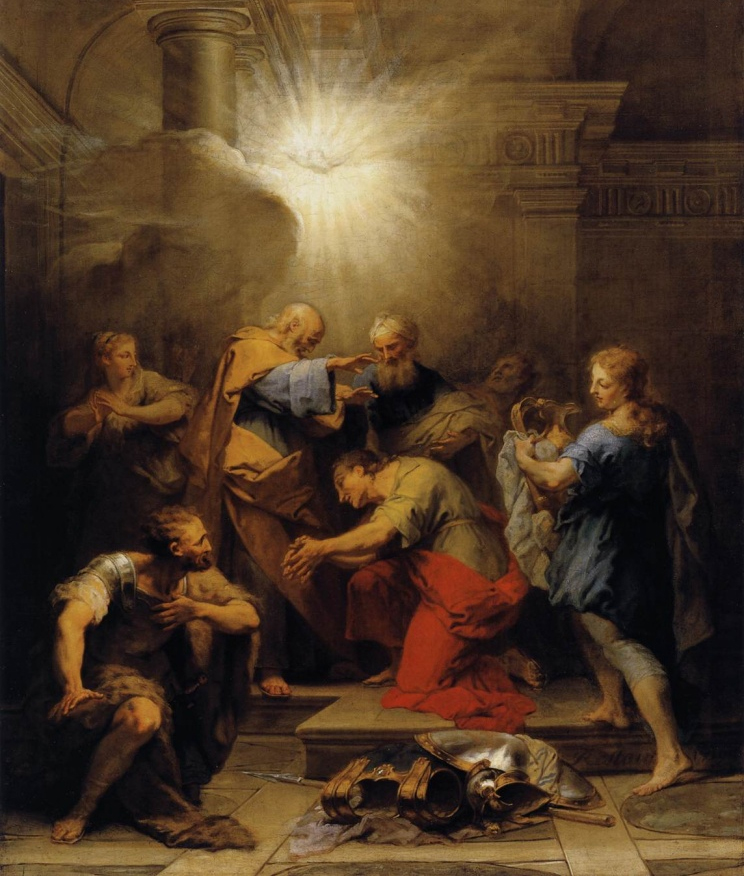
ANANIAS RESTORES SAUL'S
SIGHT |
Translation
|
|
Commentary |
|
Paragraph 3. SAUL’S ROLE AS CATECHUMEN. Verses 10-18.
|
|
Now there was at Damascus a disciple called Ananias, and the Lord spoke to him in a vision,
“Ananias !”
He answered, “I am here, Lord.”
“Rise,” said the Lord, ‘‘and go to the street called Straight Street and inquire at the house of Judas for a man named Saul, from Tarsus. He is even now praying, and has seen in a vision a man named Ananias coming in and laying his hands upon him so that he might recover sight.”
“But, Lord,” Ananias replied, “I have heard from a great many about that man, how much harm he has done to Thy saints at Jerusalem. And he has authority here too from the High Priests to put into chains all who are calling upon Thy name.”
The Lord replied, however,
“Go forward, for this very man is a chosen instrument of Mine to carry My name before the Gentiles and their kings, as well as the house of Israel, for I will show him how much he has to suffer on account of My name.”
Then Ananias went, entered the house, laid his hands upon Saul, and said,
“Saul, my brother, the Lord, namely, Jesus, who appeared to you on your way here, has sent me, in order that you may see again and be filled with the Holy Spirit.”
At once there dropped from his eyes something like scales, and he saw again, and standing up was baptized.
|
|
We get another angle of estimate on the person of Saul from the terror in which he was regarded by the Damascus Christians and the necessity of Ananias’s
receiving just as peremptory a
vision and command how to
proceed as the persecutor
himself. “I am here, Lord,” was
evidently not uttered with the
least expectation of what was to
follow. Even after the detailed
and well-nigh apologetic, if not
humorous effort to allay his
fears, Ananias is very slow to
respond. Unconsciously he
confirms Luke’s former estimate
of the havoc Saul had wrought in
Jerusalem and the high authority
he was armed with for doing the
like in Damascus. To this the
Lord must reply in terms of
further reassurance and act the
part of patron and sponsor,
telling Ananias that he who for
the present is widely known as
persecutor shall soon be a
suffering martyr for the sake of
his newly acknowledged Master
and King. The four staccato
lines beginning verse 17 reflect
the rapid response of Ananias,
and soon he gets the true state
of the situation before his
mind. Indeed, the entire scene
at Straight Street : is also
crowded into the
four clauses following, and only after sealing the visit in baptism both with water and the Holy Spirit does the Damascus disciple appear to breathe again freely. The love feast, or eucharist, in which food is taken by both Ananias and Saul, marks the beginning of a new era for both.
|
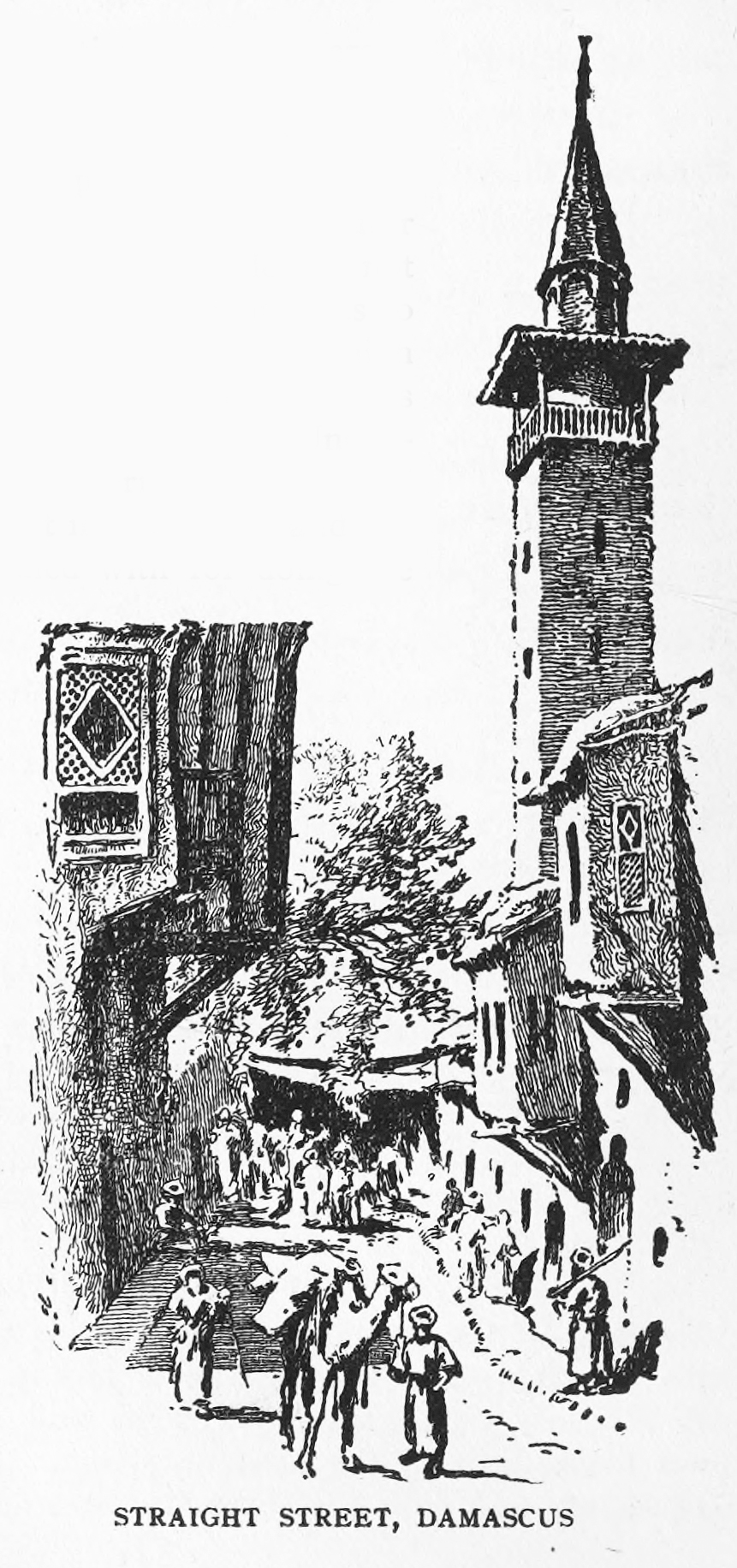
STRAIGHT STREET, DAMASCUS |
Translation
|
|
Commentary |
|
Paragraph 4. SAUL'S ROLE AS DEFENDER OF THE FAITH. Verses 19-30.
|
|
Then he remained for several days with the disciples at Damascus, and at once he began to preach in the synagogues that Jesus is the Son of God. Every-one that heard him was astonished and began to inquire,
“Ts not this the man who at Jerusalem tried to destroy those calling upon this name, and had come for the very purpose of carrying them off in chains unto the High Priests?”
But Saul’s spiritual strength kept increasing, and he continued to bewilder the Jews that lived in Damascus by the proofs he was giving that Jesus was the Christ.
After a number of days had passed the Jews plotted together to kill Saul, but he came to know their plan. They even kept watching the gates day and night in order to murder him, but his disciples took him one night and let him down through an opening in the wall, lowering him in a basket. Thus he reached Jerusalem and tried
to join the disciples, but they were all afraid of him, not believing that he was a disciple. Barnabas, however, took him and brought him to the Apostles, and told them how Saul on this journey had seen the Lord, who had spoken with him, and how he had taught fearlessly in the name of Jesus at Damascus. Thus Saul stayed with them in Jerusalem, going in and out and speaking fearlessly in the name of the Lord, and he frequently talked and had debates with the Hellenists. But they kept trying to take his life. The brothers, however, knew this, and took him down to
Caesarea and sent him away to Tarsus. |
|
Saul’s intense nature could not remain inactive, and at once he turned all his powers into the service of the new Way. This astonished his new friends only less than it did those whom he had come to rid of this pestilent heresy. Scales now fell from the eyes of both these parties. No more mighty champion of the central position of Apostolic preaching had been heard in Damascus, although that city had evidently become one of the chief points in the Diaspora for the propagation of Christian doctrine. “Jesus is the Son of God,” and “Jesus is the Christ, the Anointed One, the Messiah,” are now the ringing claims which the very arch enemy of those tenets had come to Damascus to tear out root and branch. He sets the synagogues on fire with the very torch he had brought to work desolation among the attic-hiding refugees of the Nazarene. And this follower of Gamaliel, trained from birth in the strictest knowledge of the letter of the sacred oracle, now that his mind is illumined by the Holy Spirit, marshals such infallible proofs in support of his new faith that speechless bewilderment falls upon the large Jewish colony at Damascus. Of course Saul’s zealous and able labors brought welcome results in widening the influence of the new sect, but there were obvious disadvantages, for the powers of evil were compelled in sheer desperation to organize a much more able opposition, and this meant constant fighting in the open field. For some reason Saul soon went into temporary retreat, for we accept the view that his “going away into Arabia,” mentioned in his letter to the Galatians 1, 17 (compare 2 Corinthians Xi, 32, 33), took place soon after his conversion. It stands to reason that a nature so deeply steeped in Pharisaic prejudices and general outlook would need a period of special training, or at least close reading and profound contemplation and prayer before undertaking as a life work the role of defender of the faith which he had endeavored to destroy. As the period of “three years” mentioned in Galatians was intended to cover the whole absence of Saul from Jerusalem at this epoch, it is not necessary to make his Arabian experience much more than twelve months. (See Lumby’s Cambridge Bible, ad loc.) .The period of activity following Saul’s return from Arabia, at verse 23; was evidently longer than that which preceded it, and as their protagonist was so much better equipped as to be well-nigh irresistible in open conflict, the unbelieving Jews resorted to the
satanic method of secret assassination. From this moment until his final martyrdom we will find our new Apostle a constant object of organized religious race hatred on the part of “the world-rulers of this darkness.” Was it not to equip himself for this conflict that the Arabian withdrawal was wisely invested? But Saul made friends not less tenacious than his enemies, and through their counterplot he escapes and returns finally to Jerusalem. Here he throws himself with characteristic fervor into restoring the breaches he had made in the mother church, but the very mention of his name is enough to bring his motives into question: until noble-minded Barnabas, acting as personal sponsor, allays all suspicion. But here again, as at Damascus, the persecutors he had formerly led persecute the arch persecutor, and those he formerly persecuted now save him. His ambition to remain in Jerusalem and fight his enemies into submission is neither now nor ever afterwards favored, and this fact has large part no doubt in his needing another period of retreat and meditation, this time in his native city, Tarsus, before he is fully ready for his new career.
|
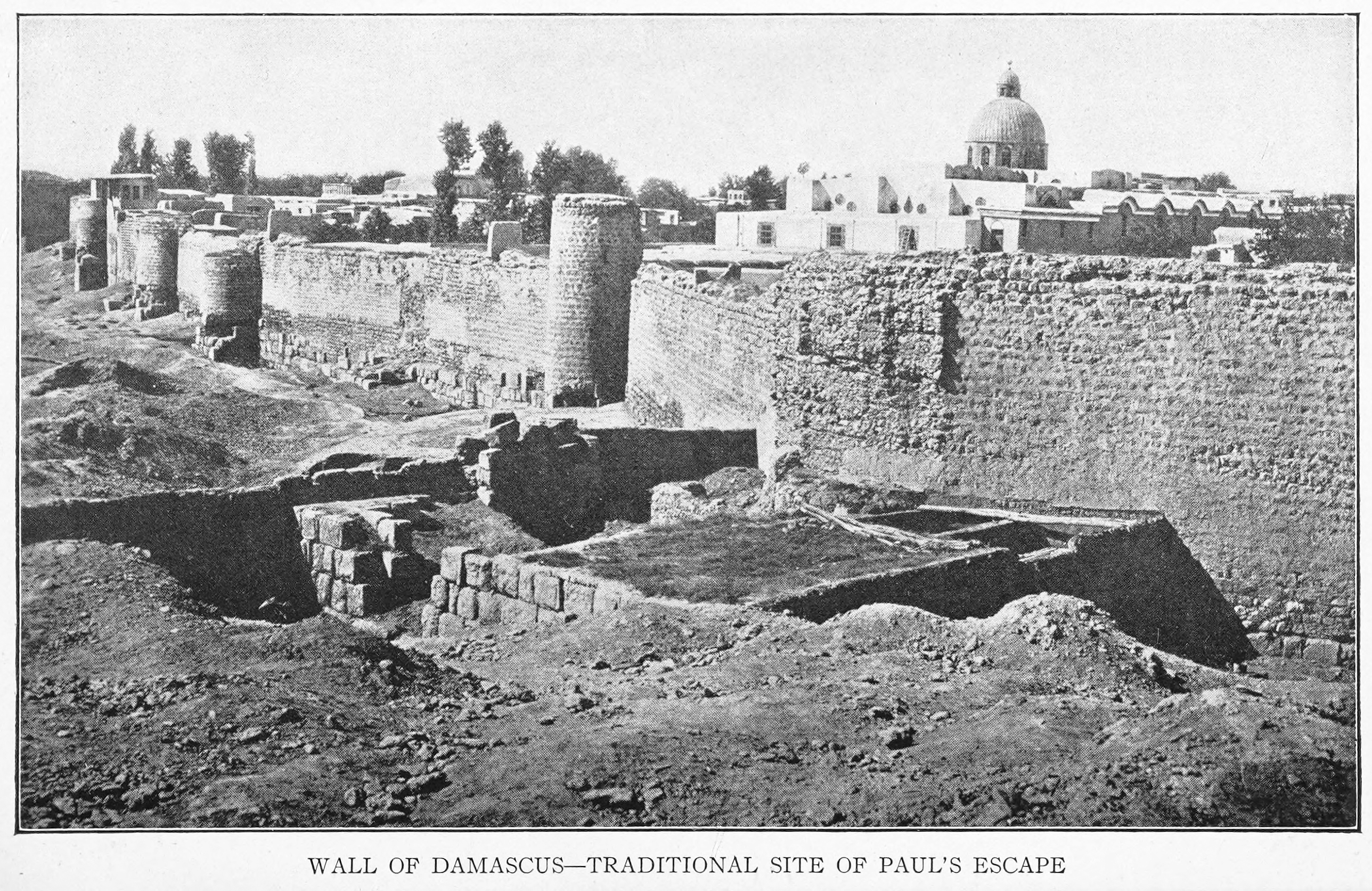
WALL OF DAMASCUS—TRADITIONAL
SITE OF PAUL’S ESCAPE |
Translation
|
|
Commentary |
|
Paragraph 5. PERIOD OF PROSPERITY THROUGHOUT PALESTINE. Verses 31-43.
|
|
a. PETER AT LYDDA HEALS ÆNEAS. Verses 31-35 |
|
Thus the church had peace throughout the whole of Judaea, Galilee, and Samaria, and it became well established and was constantly growing in numbers, living in the fear of the Lord and in the comfort of the Holy Spirit. Now, as Peter was traveling about through all
parts of the country he came down to visit the saints who lived at Lydda. There he found a man named
Æneas, who for eight years had been bedridden with paralysis. “Æneas,” Peter said to him, “Jesus Christ cures you! Rise up, and make your own bed.” He arose at once. And all the people dwelling at Lydda and in Sharon saw him and turned to the Lord.
|
|
Verse 31 introduces a paragraph of transition summing up the general condition of the Church, at the end of its period of expansion among the Jews, both orthodox and proselyte, throughout Palestine, and looking forward to its wider extension unto “the uttermost parts.”
As in the opening epoch Peter was the chosen and accepted leader, so now the historian places him foremost in the initial steps to usher in the chief business of the book. By easy yet rapid advance he himself is transformed from a narrow and somewhat bigoted partisan of exclusiveness to a liberal and eloquent exponent of the extension of grace “unto the Gentiles also.” It is the key which Peter carries that turns the lock and opens the door not alone at Jerusalem and Samaria but now at the provincial Roman seat of government,
Cæsarea. Dr. Paley and others think that Josephus (Antiquities, XIII, viii, 2) warrants the opinion that the cause of the period of peace for the church was that their enemies had to turn all their attention against the Emperor Caligula, whose effort
to rear his own statue in the Temple about this time, they barely averted by the aid of their local patron King Agrippa. Luke leads up to the well-nigh miraculous incident of the removal of scales from Peter’s eyes by two episodes of marked interest disclosing him in the role of his Master “going about doing good.” First he visits the saints in the beautiful town Lydda on the Plain of Sharon. The use of this formal term of “the saints” as in verse 13 and verse 41 tends to confirm the state of settled success which had come upon Judea. The mention of
Æneas’s period of sickness— eight years—together with his apparent faith, which does not need either mention or encouragement, may imply that he was one of
the earliest believers of Jesus’s own ministry in Judea, now about eight years past. Does not the Greek
Æneas also suggest that we have here, as in the case of Dorcas, who was also not a recent convert, though of Greek environment, a certain preparation for Peter’s vision soon to follow? The effect of his cure upon so wide an area, leading to many conversions, confirms the status and influence of
Æneas.
|
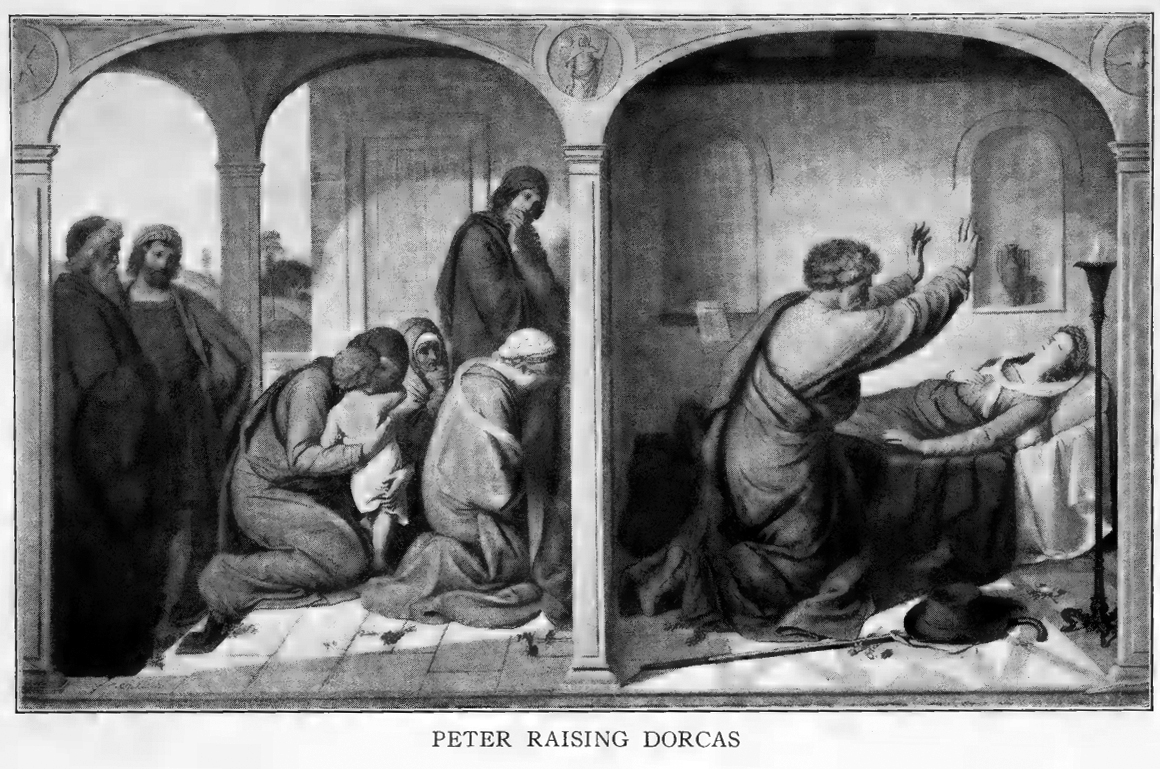
PETER RAISING DORCAS |
Translation
|
|
Commentary |
|
b. PETER AT JOPPA RAISES DORCAS. Verses 36-43 |
|
Now, at Joppa there was a disciple named Tabitha, called in Greek Dorcas, meaning Gazelle. Her life was full of beautiful and compassionate deeds, which she was always doing. But just at that time she had fallen sick and died; and they had bathed her and laid her in an upper room. As Lydda was near Joppa, and the disciples had heard that Peter was there, they sent two men to him with the request to come to them without delay. So Peter arose and went with them. When he arrived they took him up to her room, and all the widows stood by him weeping and showing him the tunics and outer garments which Dorcas used to make while she was still with them. But Peter, putting them all out of the room, and getting on his knees, began to pray, and turning toward the body, he said,
“Tabitha, rise up!”
She opened her eyes, and when she saw Peter she sat up. Then he gave her his hand, raised her up, and calling the saints and widows he presented her alive to them. This became known through all Joppa, and many believed on the Lord. Peter remained for some time at Joppa, with a tanner whose name was Simon.
|
|
The second case is that of Dorcas. This is still more extreme, but the fame of Peter and the faith of the saints make her raising even from death only one more of those signs of divine sanction recorded by Dr. Luke. Joppa was doubtless Peter’s objective from the first. It lay only ten miles northwest of Lydda on the seacoast. The data are full enough to warrant believing Joppa at that time the main center of Christian influence along the coast. Six witnesses go thence with Peter to
Cæsarea and also to Jerusalem a little later. The mention of widows and works and workers of charity with Dorcas enlarges the background, as also does the sending of delegates to hasten his coming to Joppa. Dr. Ramsay well remarks that “the description of the scene when Peter arrived at the house strongly suggests the account of an eyewitness before whose memory the visible details stood out clearly.” Since Peter put all out of the room, and appears to have had no close companion like John on this trip, we suggest that he is himself the source of the narrative. Hobart suggests that the circumstantial account coincides with Luke’s custom in recording cures, etc., in terms of a medical practitioner. The similarity of this case with that of the raising of Jairus’s daughter, where Peter was present, is often remarked; even the similarity of the names “Talitha” and “Tabitha” is made much of by some. As the craft of tanner was considered degrading among the Jews, and yet Peter makes his home at Joppa with the tanner, Simon, it has been thought that we get here another glimpse at the process in Peter’s preparation for his change of mind toward things usually esteemed common or unclean. Dr. Lumby states it clearly thus: “In the mind of Saint Peter some prejudices of the Jews were already becoming of small account,”
|
|
|
|
|
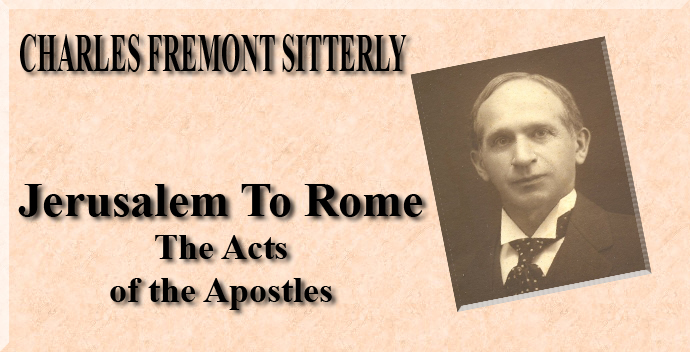


 Home
Home What's New
What's New Bible
Bible Photos
Photos Hiking
Hiking E-Books
E-Books Genealogy
Genealogy Profile
Free Plug-ins You May Need
Profile
Free Plug-ins You May Need
 Get Java
Get Java.png) Get Flash
Get Flash Get 7-Zip
Get 7-Zip Get Acrobat Reader
Get Acrobat Reader Get TheWORD
Get TheWORD


